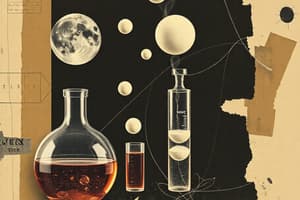Podcast
Questions and Answers
What is the solubility rule for nitrates (NO3-)?
What is the solubility rule for nitrates (NO3-)?
- Nitrates vary in solubility
- All nitrates are soluble (correct)
- All nitrates are insoluble
- Only some nitrates are soluble
What is the solubility rule for acetates (C2H3O2-)?
What is the solubility rule for acetates (C2H3O2-)?
- All acetates are insoluble
- Only some acetates are soluble
- Acetates vary in solubility
- All acetates are soluble (correct)
Which chloride (Cl-) exceptions to solubility are correct?
Which chloride (Cl-) exceptions to solubility are correct?
- All chlorides are soluble
- AgCl, Hg2Cl2, PbCl2 (correct)
- NH4Cl, BaCl2, LiCl
- NaCl, KCl, CaCl2
What is the solubility rule for bromides (Br-)?
What is the solubility rule for bromides (Br-)?
What is the solubility rule for iodides (I-)?
What is the solubility rule for iodides (I-)?
Which of the following iodates (IO3-) is NOT soluble?
Which of the following iodates (IO3-) is NOT soluble?
What is the solubility rule for sulfates (SO4-2)?
What is the solubility rule for sulfates (SO4-2)?
What is the solubility rule for sulfides (S-2)?
What is the solubility rule for sulfides (S-2)?
Which carbonates (CO3-2) are soluble?
Which carbonates (CO3-2) are soluble?
What is the solubility rule for phosphates (PO4-3)?
What is the solubility rule for phosphates (PO4-3)?
What is the solubility rule for hydroxides (OH-)?
What is the solubility rule for hydroxides (OH-)?
Ammonium (NH4+) is always soluble.
Ammonium (NH4+) is always soluble.
Are halides (Cl-, Br-, I-) generally soluble, and what are the exceptions?
Are halides (Cl-, Br-, I-) generally soluble, and what are the exceptions?
Perchlorate (ClO4-) is always soluble.
Perchlorate (ClO4-) is always soluble.
Flashcards are hidden until you start studying
Study Notes
Nitrate and Acetate Solubility
- Nitrate ions (NO3-) are universally soluble in water.
- Acetate ions (C2H3O2-) are also universally soluble.
Halide Solubility
- Chlorides (Cl-) are generally soluble, with exceptions including AgCl, Hg2Cl2, and PbCl2.
- Bromides (Br-) are soluble except for AgBr, Hg2Br2, and PbBr2.
- Iodides (I-) are soluble with exceptions for Ag, Hg, and Pb compounds.
Iodate and Sulfate Solubility
- Iodates (IO3-) are soluble except for specific compounds: Sr(IO3)2, Ca(IO3)2, Ba(IO3)2, Pb(IO3)2, Hg2(IO3)2, and AgIO3.
- Sulfates (SO4-2) are soluble with notable exceptions including CaSO4, SrSO4, BaSO4, PbSO4, and Hg2SO4.
Insoluble Compounds
- Sulfides (S-2) are generally insoluble, with soluble exceptions being those of alkali metals (1A elements), Ba(OH)2, Sr(OH)2, Ca(OH)2, and ammonium sulfide ((NH4)2S).
- Carbonates (CO3-2) are also mostly insoluble, but those associated with 1A elements and (NH4)2CO3 are exceptions.
- Phosphates (PO4-3) are generally insoluble, with exceptions for those of 1A elements and (NH4)3PO4.
- Hydroxides (OH-) are mostly insoluble, except for those of 1A elements, ammonium (NH4), Ba(OH)2, Sr(OH)2, and Ca(OH)2.
Ammonium and Perchlorate Solubility
- Ammonium ion (NH4+) is always soluble.
- Perchlorate ion (ClO4-) is also always soluble.
General Halide Rule
- Halides (including Cl-, Br-, I-) are soluble generally, with the same exceptions for silver, mercury(II), and lead compounds.
Studying That Suits You
Use AI to generate personalized quizzes and flashcards to suit your learning preferences.




